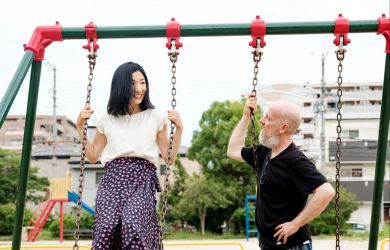
January 8, 2020
Five (Translated) Japanese Novels to Read in 2020
And almost all of them are written by women
By Jessica Esa
Last year was a fairly good year for Japanese literature in translation, with breakout books by beloved mystery writer Seishi Yokomizo (“The Honjin Murders”) and newer authors like Hiroko Oyamada (“The Factory”), in addition to translations of appraised authors Yoko Ogawa and Hiromi Kawakami. In 2020, however, we’re promised an even better year, with more books by Oyamada and Yokomizo on the way, as well as a brand new novel from award-winning “Convenience Store Woman” author, Sayaka Murata. Out of several anticipated reads in the works, we’ve narrowed down our list to five exciting Japanese books in translation, most of which are written by women, to watch out for this year.
Breasts and Eggs
by Mieko Kawakami (translated by Sam Bett and David Boyd)
Mieko Kawakami is a musician, blogger and highly successful writer in Japan whose only English-translated work thus far is 2017’s “Ms Ice Sandwich.” Coming out this spring is her 2008 novella “Breasts and Eggs,” which details a three-day reunion between a 30-year-old unmarried narrator, her sister Makiko and Makiko’s daughter, Midoriko. Kawakami focuses in on each woman’s respective struggles with identity and the female body, tackling big themes with humor and offering a cold, hard look at the many pressures facing women in Japan. The translated version expands on the original with a second chapter based 10 years later, at which point the narrator is considering artificial insemination. “Breasts and Eggs” opens a discussion on reproductive rights within Japan, and the social struggles associated with one woman making her choice.
Published by Picador Books in May 2020.
Full review of Breast and Eggs.
Where the Wild Ladies Are
by Aoko Matsuda (translated by Polly Barton)
Feminist retellings of classic tales are always fun and rapidly growing in popularity around the world. In 2020, taking a collection of traditional Japanese ghost stories and crafting them into often humorous yet painfully relevant tales is a move of pure genius by Aoko Matsuda. Taking place in a contemporary setting, with a decidedly feminist bend, “Where the Wild Ladies Are” takes classic Japanese ghost stories — which make up some of the best in the world — and rewrite them to make them relevant to the current gender climate of modern-day Japan. Witty, biting, and poignant, Matsuda’s collection is a pleasantly haunting surprise.
Published by Tilted Axis Press in February 2020.
Love Japanese literature? Also check out:
- “The Hole” by Hiroko Oyamada
- Yukio Mishima: The Resurgence of a Japanese Literary Master
- Five (Translated) Japanese Novels to Read in 2020
- Yoko Tawada’s The Emissary: Mutation and hope in a not-so-distant dystopian Tokyo
- Tokyo Ueno Station: Yu Miri’s latest novel offers an intimate insight into a harsher side of Tokyo
- Breasts and Eggs: Mieko Kawakami’s intimate portrait of womanhood
The Inugami Curse
by Seishi Yokomizo (Translated by Yumiko Yamakazi)
This past December, Pushkin Press published an English translation of the very first book in Seishi Yokomizo’s legendary detective series, “The Honjin Murders.” Just three months later, the London-based publishing house is bringing us another classic. Introduced in “The Honjin Murders” was Yokomizo’s own Poirot, the young and eclectic Detective Kosuke Kindaichi. In “The Inugami Curse” — one of Yokomizo’s best-loved detective tales — Kindaichi must solve a slowly growing string of gruesome murders all connected to the mighty Inugami Clan, and uncover the deeply hidden secrets of the clan along the way.
Published by Pushkin Press in February 2020.
Earthlings
by Sayaka Murata (Translated by Ginny Tapley Takemori)
“Convenience Store Woman” was an enormous and earth-shattering commercial success in 2018, thanks to the story of protagonist Kiko being strangely relatable to many across the English-speaking world. After stirring the hearts and minds of readers with her raw tale of being a cog in Japan’s modern capitalist machine, literary superstar Sayaka Murata returns in 2020 with “Earthlings.” Murata’s newest novel traces the imaginative childhoods of Natsuki and Yuu, both of whom are convinced that they are either witches or aliens. The story then jumps ahead to Natsuki’s adult life as a married woman and her eventual return home to the Nagano mountains to reunite with her dear cousin. While a seemingly benign tale at first glance, the Akutagawa Prize-winner laces her tale with much deeper, darker and prevalent themes of emotional abuse and mental illness.
Published by Granta in October 2020.
There’s No Such Thing As an Easy Job
by Kikuko Tsumura (Translated by Polly Barton)
“There’s No Such Thing As an Easy Job” is Osaka-born author Kikuko Tsumura’s first work to be translated into English. Tsumura has won numerous awards, including the prestigious Akutagawa Prize for her 2009 novella “The Lime Pothos Boat.” The title of her upcoming translation speaks for itself. A perfect blend of black humor and criticism of the modern workplace, “There’s No Such Thing As an Easy Job” opens with a young woman looking for a mundane job close to home. What ensues is a string of unspectacular occupations involving video footage, advertising and rice crackers. All of these jobs come with hilarious shortcomings as far as employment goes and ultimately leave her unsatisfied. Tsumura’s protagonist soon discovers that she’s actually looking for something much more meaningful in life.
Published by Bloomsbury in late 2020.





